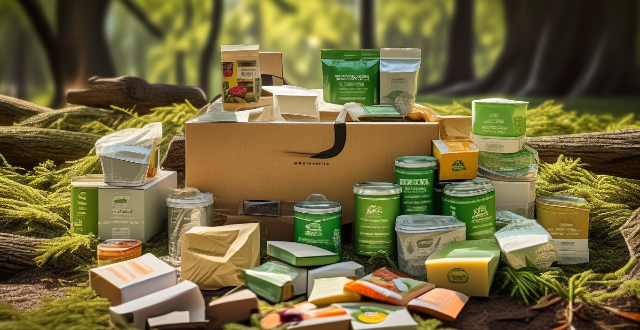Disposing trash and waste responsibly while camping is crucial for preserving the environment. The golden rule of Leave No Trace is to pack out everything you bring into the wilderness, including food scraps, paper products, plastic packaging, cans, bottles, and used toiletries. If there are no toilet facilities available, dispose of human waste properly by digging a cathole at least 200 feet away from water sources, campsites, and trails. Recycling and composting facilities should be utilized if available, with recyclable materials such as aluminum cans, plastic bottles, glass jars, and cardboard boxes separated from regular trash. Compostable materials include fruit and vegetable peels, coffee grounds and filters, eggshells, and yard trimmings. To minimize waste production, plan meals carefully, use reusable items instead of disposable ones, bring your own containers when buying food or supplies on the go, and choose eco-friendly products made from sustainable materials or with minimal packaging. By following these guidelines, we can enjoy our camping trips while minimizing our impact on the environment and preserving our planet for future generations.

Disposing Trash and Waste Responsibly While Camping
Camping is an activity that allows us to immerse ourselves in nature, but it also comes with the responsibility of preserving the environment. One of the most important aspects of responsible camping is disposing of trash and waste properly. Here are some tips on how to do so:
Pack It In, Pack It Out
The golden rule of Leave No Trace is to pack out everything you bring into the wilderness. This means that all trash and waste should be carried back out with you. Make sure to bring enough garbage bags or containers to store your trash until you can dispose of it properly.
Examples of items to pack out include:
- Food scraps
- Paper products (napkins, tissues)
- Plastic packaging
- Cans and bottles
- Used toiletries (toothpaste tubes, soap bottles)
Proper Disposal of Human Waste
If there are no toilet facilities available, it's important to dispose of human waste properly to prevent contamination of water sources and wildlife. Here are some steps to follow:
1. Dig a cathole: Find a location at least 200 feet (60 meters) away from water sources, campsites, and trails. Dig a hole 6-8 inches deep and 4-6 inches wide.
2. Deposit waste: Squat over the hole and deposit waste into the hole. If using toilet paper, make sure it's biodegradable and deposit it in the hole as well.
3. Cover and fill the hole: Once finished, cover the hole with the soil you removed earlier and pack down firmly. There should be no evidence of the cathole left behind.
Recycling and Composting
If recycling or composting facilities are available at your campsite, take advantage of them! Separate your recyclables and compostable materials from your regular trash and dispose of them accordingly.
Examples of recyclable materials include:
- Aluminum cans
- Plastic bottles
- Glass jars
- Cardboard boxes
Examples of compostable materials include:
- Fruit and vegetable peels
- Coffee grounds and filters
- Eggshells
- Yard trimmings (if allowed)
Minimize Waste Production
Another way to responsibly dispose of trash and waste while camping is to minimize your waste production in the first place. Here are some tips:
1. Plan meals carefully: Bring only what you need and plan meals that produce minimal waste. For example, choose foods that come in reusable containers or have minimal packaging.
2. Use reusable items: Instead of disposable plates, cups, and utensils, opt for reusable items that can be washed and used again.
3. Bring your own containers: If buying food or supplies on the go, bring your own containers to avoid excess packaging.
4. Choose eco-friendly products: Look for products made from sustainable materials or with minimal packaging.
By following these guidelines, you can enjoy your camping trip while minimizing your impact on the environment. Remember, leaving nature better than we found it is essential for preserving our planet for future generations.